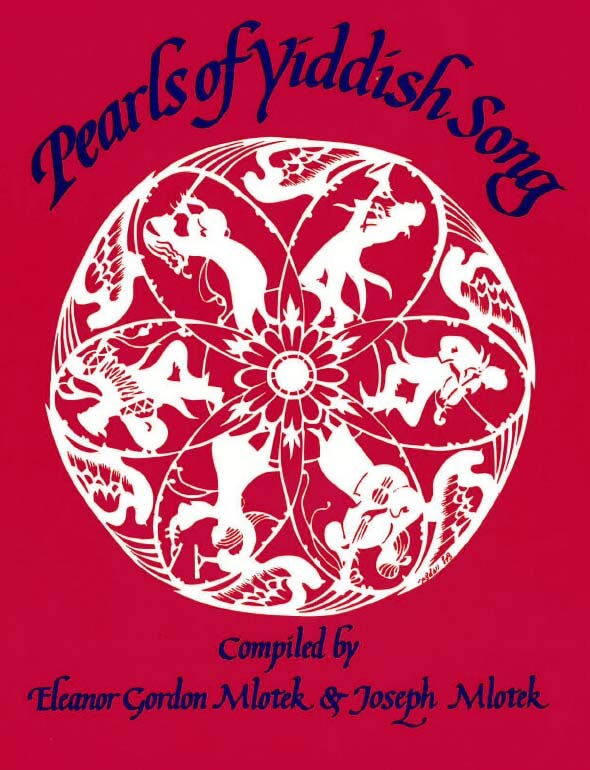Words by Aaron Zeitlin (1889-1973); music by Sholom Secunda (1894-1974). Published in sheet music by Metro Music Co., N.Y., 1943.
Originally entitled “Dana, dana, dana,” the song was written for Zeitlin’s play Esterke, produced by Maurice Schwartz in 1940-1, and printed in the program. It became one of the most widely sung Yiddish songs and was performed in Yiddish and English translation by Theodore Bikel, Joan Baez and others. Translations have also appeared in German and Korean.
In some collections, beginning with Ben Yomen’s (1946), the words are erroneously attributed to Yitskhok Katzenelson, Hebrew-Yiddish poet active in the Warsaw Ghetto underground. In a recent record produced in Germany, not only is the song attributed to Katzenelson, it is also interpreted as having been written in the Ghetto to express Jews’ longing for freedom.

In a wagon lies a calf; it is tied with a rope.
High in the sky a swallow soars, is joyous and runs back and forth.
The wind laughs in the rye, laughs and laughs and laughs.
It laughs a whole day plus half the night.
Dona, Dona, Dona…
The calf cries and the farmer says:
Who told you to be a calf?
You could have been a bird,
You could have been a swallow.
Poot calves are bound and dragged and slaughtered.
Whoever has wings flies high and is no one’s slave.
Oyfn furl ligt dos kelbl,
Ligt gebundn mit a shtrik,
Hoykh in himl flit dos shvelbl,
Freyt zikh, dreyt zikh hin un krik.
Refrain:
Lakht der vint in korn,
Lakht un lakht un lakht,
Lakht er op a tog a gantsn
Mit a halber nakht.
Dona, dona, dona…
Shrayt dos kelbl, zogt der poyer:
Ver zhe heyst dikh zayn a kalb?
Volst gekert tsu zayn a foygl,
Volst gekert tsu zayn a shvalb.
Bidne kelber tut men bindn
Un men shlept zey un men shekht,
Ver s’hot fligl, flit aroyftsu,
Iz bay keynem nit keyn knekht
אױפֿן פֿורל ליגט דאָס קעלבל,
ליגט געבונדן מיט אַ שטריק,
הױך אין הימל פֿליט דאָס שװעלבל,
פֿרײט זיך, דרײט זיך הין און קריק.
רעפֿרײן:
לאַכט דער װינט אין קאָרן,
לאַכט און לאַכט און לאַכט,
לאַכט ער אָפּ אַ טאָג אַ גאַנצן
מיט אַ האַלבער נאַכט.
דאָנאַ, דאָנאַ, דאָנאַ. . .
שרײַט דאָס קעלבל, זאָגט דער פּױער:
װער זשע הײסט דיך זײַן אַ קאַלב?
װאָלסט געקערט צו זײַן אַ פֿױגל,
װאָלסט געקערט צו זײַן אַ שװאַלב.
בידנע קעלבער טוט מען בינדן
און מען שלעפּט זײ און מען שעכט,
װער ס’האָט פֿליגל, פֿליט אַרױפֿצו,
איז בײַ קײנעם ניט קײן קנעכט.
Song Title: Dona Dona

First published in 1988 as Pearls of Yiddish Song: Favorite Folk, Art and Theatre Songs, this anthology contains 115 songs. Some material had never been published, while others, included in rare song collections or sheet music, were largely inaccessible. The songs presented reflect Jewish life in Eastern Europe and the United States and depict childhood, love, family celebrations, poverty, work and struggle. There are also songs from the Hasidic and Maskilic movements, songs of Zion and of America, as well as songs from the Yiddish theater.
The title of this anthology derives from the weekly two-page feature column “Pearls of Yiddish Poetry,” which the compilers Yosl and Chana Mlotek initiated in 1970 in the Yiddish newspaper Der Forvertz (the Yiddish Daily Forward). Hundreds of readers from around the world — including authors, composers, singers, actors — became co-participants in this collective folk project and recalled melodies, lines, fragments, stanzas and their variants of songs, poems, and plays which they had heard in their youth. At first, readers sent in only written material. Later, they also taped songs on cassettes, many of whose melodies had, until then, never been recorded. They also identified and supplied missing information regarding lyricists, poets, and composers and described the circumstances surrounding the songs’ origins, their dissemination, diffusion and impact.